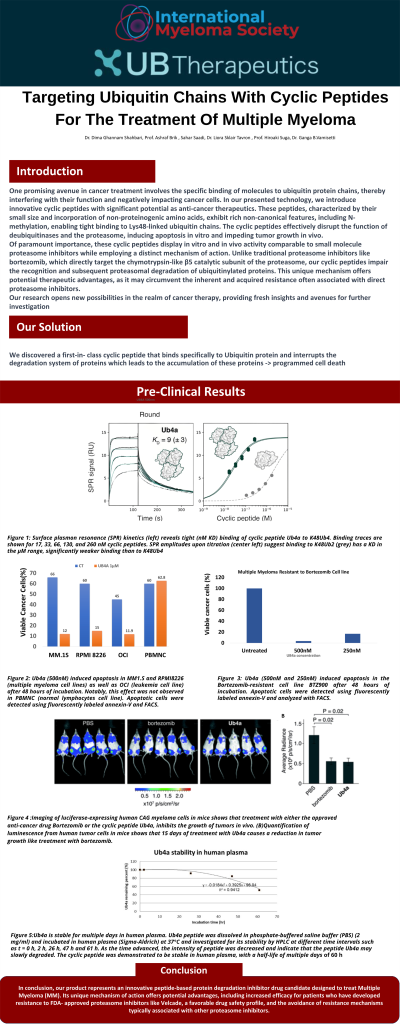Treatment of Relapsed/Refractory Myeloma
Poster Session 2
P-259: Targeting Ubiquitin Chains With Cyclic Peptides For The Treatment Of Multiple Myeloma
Thursday, September 28, 2023
12:30 PM - 1:30 PM EEST


Dima Ghannam-Shahbari, PhD (she/her/hers)
CEO
UB-Therapeutics
Nazareth , Israel, Israel
Introduction: Recent research has uncovered small, non-proteinogenic cyclic peptides that tightly bind Lys48-linked ubiquitin chains. These peptides inhibit deubiquitinases and the proteasome, leading to apoptosis in vitro and attenuating tumor growth in vivo. This breakthrough highlights the potential of non-proteinogenic cyclic peptides as promising anti-cancer agents that target ubiquitin chains.
Methods: Pre-Formulation Study, Apoptosis Assay, XTT Assay, PK Study, Analytical Development Assay, MTD Assay, In Vivo Efficacy Study
Results: *The study focuses on the development of novel cyclic peptides that have potential anti-cancer therapeutic properties. These peptides, which are small and contain non-proteinogenic amino acids, specifically bind to Lys48-linked ubiquitin chains. By blocking deubiquitinases and the proteasome, they induce apoptosis in cancer cells and inhibit tumor growth both in vitro and in vivo. Unlike traditional proteasome inhibitors, these cyclic peptides disrupt the recognition and degradation of ubiquitinylated proteins, offering a different mechanism of action that may overcome resistance associated with direct proteasome inhibitors.
*These cyclic peptides effectively inhibited Ub-dependent proteolysis, could enter cells, and induced the accumulation of Ub-conjugates. In vitro studies demonstrated their ability to inhibit the cleavage of K48Ub4 by a specific deubiquitinating enzyme and the degradation of K48Ub4-tagged proteins by the proteasome. Moreover, the cyclic peptides were internalized by live cells, induced apoptosis in cancer cell lines, and showed anti-cancer activity in vivo.
*The cyclic peptide Ub4a displayed stability in human plasma for multiple days, with a half-life of 60 hours, suggesting its potential for therapeutic applications.
Overall, the study highlights the promising therapeutic potential of cyclic peptides as a novel approach for cancer treatment by targeting ubiquitin protein chains.
Conclusions: This comprehensive investigation encompassed pre-formulation characterization, assessment of apoptotic activity, cell viability inhibition, pharmacokinetic profiling, analytical method development, determination of MTD, and evaluation of in vivo efficacy. The results provide valuable insights into the therapeutic potential of the novel cyclic peptides as anti-cancer agents, demonstrating their promise for further development and potential clinical applications.
Methods: Pre-Formulation Study, Apoptosis Assay, XTT Assay, PK Study, Analytical Development Assay, MTD Assay, In Vivo Efficacy Study
Results: *The study focuses on the development of novel cyclic peptides that have potential anti-cancer therapeutic properties. These peptides, which are small and contain non-proteinogenic amino acids, specifically bind to Lys48-linked ubiquitin chains. By blocking deubiquitinases and the proteasome, they induce apoptosis in cancer cells and inhibit tumor growth both in vitro and in vivo. Unlike traditional proteasome inhibitors, these cyclic peptides disrupt the recognition and degradation of ubiquitinylated proteins, offering a different mechanism of action that may overcome resistance associated with direct proteasome inhibitors.
*These cyclic peptides effectively inhibited Ub-dependent proteolysis, could enter cells, and induced the accumulation of Ub-conjugates. In vitro studies demonstrated their ability to inhibit the cleavage of K48Ub4 by a specific deubiquitinating enzyme and the degradation of K48Ub4-tagged proteins by the proteasome. Moreover, the cyclic peptides were internalized by live cells, induced apoptosis in cancer cell lines, and showed anti-cancer activity in vivo.
*The cyclic peptide Ub4a displayed stability in human plasma for multiple days, with a half-life of 60 hours, suggesting its potential for therapeutic applications.
Overall, the study highlights the promising therapeutic potential of cyclic peptides as a novel approach for cancer treatment by targeting ubiquitin protein chains.
Conclusions: This comprehensive investigation encompassed pre-formulation characterization, assessment of apoptotic activity, cell viability inhibition, pharmacokinetic profiling, analytical method development, determination of MTD, and evaluation of in vivo efficacy. The results provide valuable insights into the therapeutic potential of the novel cyclic peptides as anti-cancer agents, demonstrating their promise for further development and potential clinical applications.
